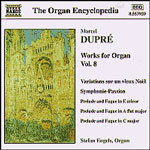
Works for organ Vol 8
 $25.00
Out of Stock
$25.00
Out of Stock6+ weeks add to cart
MARCEL DUPRE
Works for organ Vol 8
Stefan Engels (organ)
[ Naxos Organ Encyclopedia / CD ]
Release Date: Saturday 1 May 2004
This item is currently out of stock. It may take 6 or more weeks to obtain from when you place your order as this is a specialist product.
"Stephan Engels brings youthful vitality to these well-known scores. Though recorded in the extreme acoustics of the Heilig-Geist Kirche in Mannheim, Engels carefully articulates and sets off motives. The room lends its own long line to Dupre's phrases. Certainly, the canonic variations on the Noel would be pedestrian if not minced elsewhere. Here, they remain lucid and intelligible. Likewise the diabolical C-Major Fugue remains intelligible throughout its demonic episodes. I find it's gratifying to hear this convincingly French and arguably exciting Karl Gockel organ in Mannheim. Perhaps as a result of the acoustical qualities of the church, the organ evinces the muscle and impact of instruments ordinarily twice its size."
- Haig Mardirosian, Fanfare, Dec 99
Marcel Dupré was born into a musical family in Rouen in 1886. His father was an organist who had been a pupil of Guilmant and taught his son from the time the boy was eleven. Dupré was admitted to the Paris Conservatoire at the age of sixteen, and among his teachers was Widor, whose assistant he became at the great Paris church of Saint-Sulpice four years later. Having won the coveted Grand Prix de Rome in 1914, he began his rise to fame with international recital tours, in which he performed, in Paris and New York, Bach's complete organ works from memory, a remarkable feat which had been his ambition since he was a child. His American début concluded with an improvised four-movement organ symphony, described at the time as "a musical miracle".
In 1925 Dupré brought a house in the Parisian suburb of Meudon, where he had installed a house organ which had belonged to Guilmant. Pupils from all over the world were soon to flock here. A year later he was appointed professor of organ at the Paris Conservatoire, where his pupils included both Jéhan and Marie-Claire Alain, Jean Guillou, Jean Langlais, and Olivier Messiaen. In 1934 he succeeded Widor as organist of Saint-Sulpice, where he remained for the rest of his life, improvising as has always been the custom in France, for the Mass and Office, unfailingly matching the music to the occasion. He also published a famous edition of Bach's organ works, as well as textbooks including the well-known Cours d'Improvisation. In the succeeding years until his death in 1971 he received many honours and awards, and composed works that now appear on recital programmes and in recordings all over the world. On the morning of the very day of his death, at home in Meudon, he played his two last Masses at Saint-Sulpice.
Dupré's attempted to separate music connected with his concert career from that associated with the Church, but the Variations sur un vieux Noël and the Symphonie Passion bring his religious convictions magnificently into the concert hall.
Tracks:
Variations sur un vieux Noel, Op. 20
3 Preludes and Fugues, Op. 36
Symphonie-Passion, Op. 23
